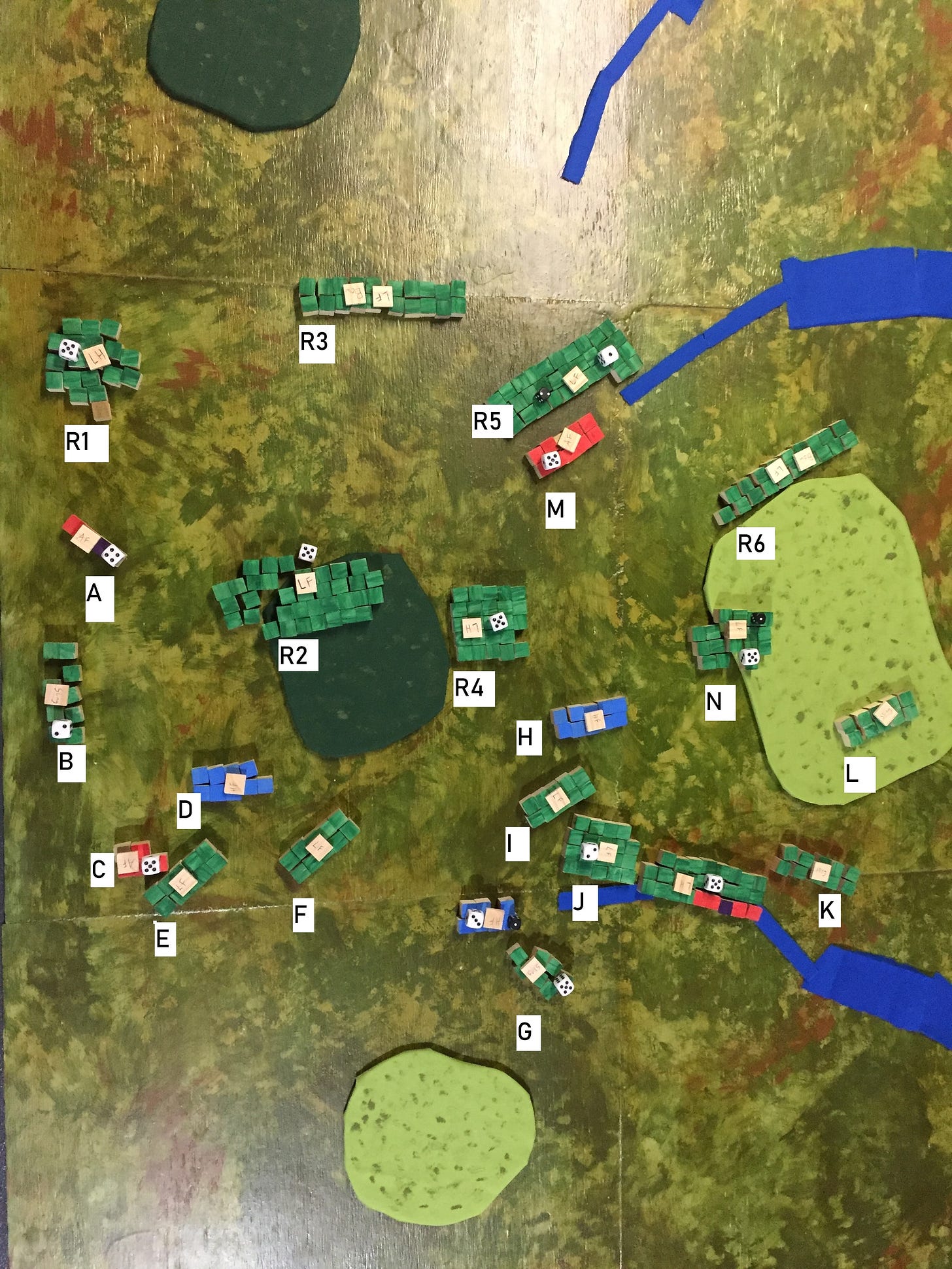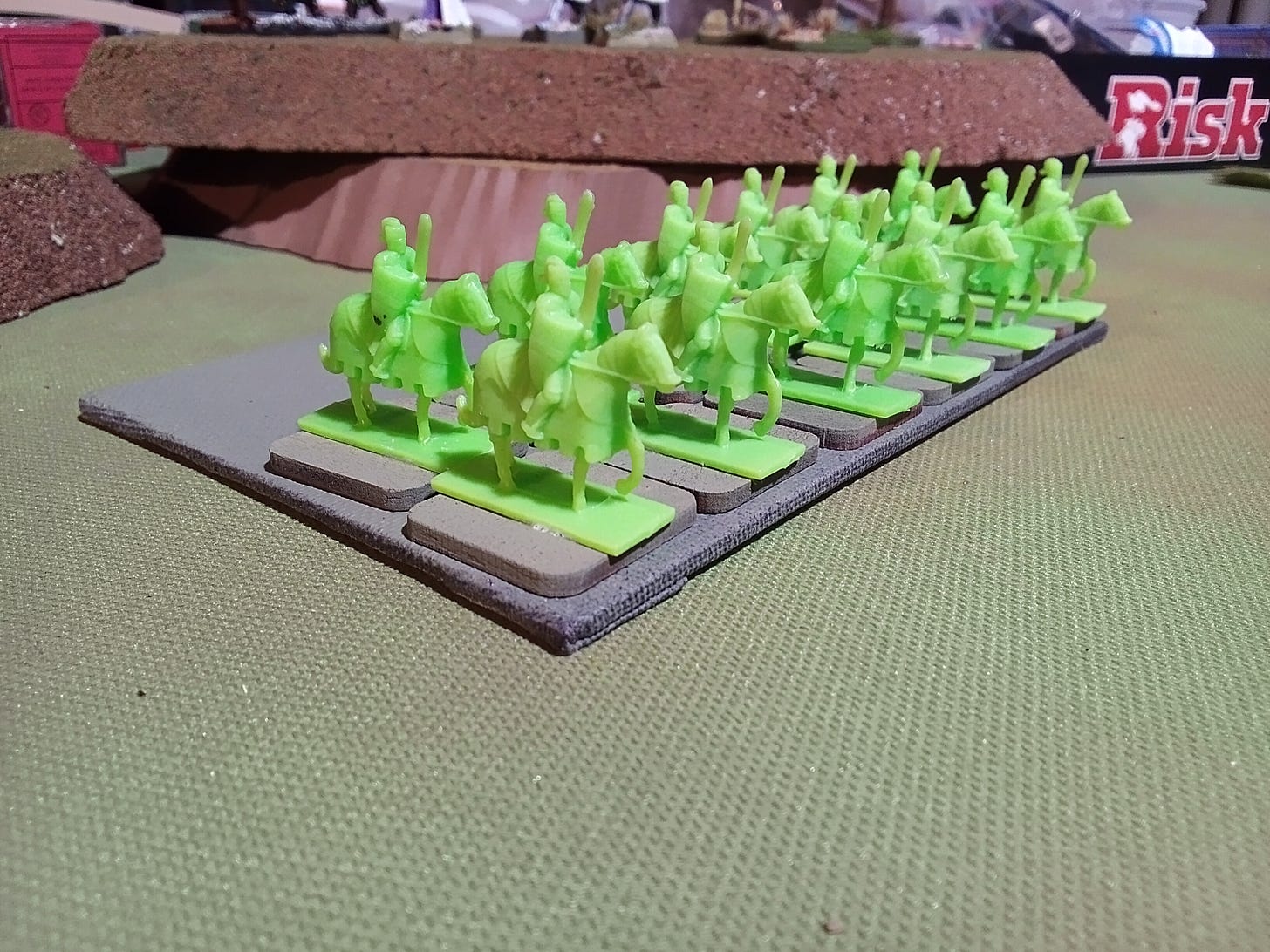In the previous post I shared some expanded economic rules based on ideas from Bill Lamming’s Medieval Campaigns.
Today we look at a possible Turn Sequence for the Boardgame-as-Campaign-Management-Tool. This definitely needs some work and playtesting.
Turn Sequence (Two per Season)
The basic unit of time for the campaign is the Season. During Spring, Summer and Fall your troops can move and fight, your peasants can labor, and so on. In the Winter the weather is cold & snowy, making warfighting difficult, if not impossible, and reducing the amount of revenue available to a Faction or Domain.
Each Campaign Season consists of two Campaign Turns, following this sequence:
1. Pay Expenses
o Maintenance for troops, fortifications, court expenses, and winter provisions.
o Failure to pay may result in desertion, unrest, or weakened garrisons.
2. Espionage (One attempt per Turn per Faction)
Roll 2d6 + Agent Skill + Modifiers
Agent Skill Ranges:
o Incompetent (-2)
o Novice (0)
o Trained (+1)
o Expert (+2)
o Master Spy (+3)
Modifiers (Cumulative):
o Target is suspicious or has strong security: -2
o Target is distracted by war/civil unrest: +2
o Mission has inside help (bribes, turncoats): +3
o Mission is rushed (one turn faster): -1
o Counterespionage is active in the area: -3
o Types of Espionage Missions & Outcomes
§ Roll
§ Outcome
§ 2-4
§ Total Failure: Mission fails spectacularly, agent is captured or killed. If an assassination, the target becomes aware of the plot. If a sabotage, it backfires.
§ 5-6
§ Failure: Mission fails with no effect, but the agent escapes.
§ 7-8
§ Partial Success: Some information is gathered or minor damage is done, but the enemy is alerted to possible espionage.
§ 9-10
§ Success: The mission is completed as intended with minimal risk.
§ 11-12
§ Complete Success: Mission succeeds perfectly, and enemy remains unaware of espionage.
Examples of Espionage Effects
o Spy on Rival: Gain knowledge of enemy troop movements and resources.
o Sabotage: Destroy bridges, poison wells, or disrupt supplies.
o Assassination: Attempt to kill a leader or disrupt enemy command.
o Counterespionage: Roll defensively to prevent enemy spying or sabotage.
3. Diplomacy (Two Overtures per Turn per Faction)
Each Campaign Turn, factions can attempt one Espionage action and two Diplomatic overtures.
The outcome of each is determined by rolling 2d6 + Diplomat Skill + Relationship Modifiers
Diplomat Skill Ranges:
§ Untrained (-2)
§ Standard (0)
§ Respected (+1)
§ Master Negotiator (+2)
Modifiers (Cumulative):
§ Past betrayals with target faction: -3
§ Ongoing war with target faction: -2
§ Shared religion with target faction: +2
§ Trade agreements or prior treaties exist: +2
§ Target faction is desperate (war, famine, unrest): +3
§ Using bribes, gifts, or hostages: +1 to +4
Types of Diplomatic Actions & Outcomes
§ Roll
§ Outcome
§ 2-4
§ Insulting Failure: The overture is rejected, and relations worsen.
§ 5-6
§ Failure: No agreement is reached, but no ill will results.
§ 7-8
§ Minor Success: A tentative agreement is reached but requires additional concessions.
§ 9-10
§ Success: The agreement is fully accepted.
§ 11-12
§ Complete Success: The agreement is accepted with additional unexpected benefits.
Examples of Diplomatic Actions
§ Propose Alliance/Non-Aggression Pact: Ensure military support or neutrality.
§ Offer/Demand Tribute: Request resources or taxation agreements.
§ Arrange Political Marriage: Strengthen dynastic ties.
§ Broker Peace/Trade Agreement: End a war or establish economic ties.
§ Encourage/Undermine Religious Influence: Increase or disrupt faith-based power.
4. Troop Movement (Based on Hexes and Terrain)
o Armies move based on map scale and technology level.
o Weather, road conditions, and supply lines affect movement speed.
5. Resource Allocation
o Assign peasants, artisans, and nobles to various tasks:
§ Farm, log, mine, herd, or craft goods.
§ Build fortifications, roads, or irrigation.
§ Manage trade routes or religious duties.
o Can redirect funds to military, economy, or religious projects.
6. Battles (When Armies Collide or Sieges Begin)
o Combat is resolved using massed combat rules of your choice.
§ Sieges require Supply Management, Siege Engines, or Starvation Tactics.
7. Raising Troops (Levies and Mercenaries)
o Peasant levies, professional troops, and mercenaries can be raised.
o Mercenaries (costly, can betray employer if unpaid or bribed).
8. Collect Revenue
o Resource Income is collected at the end of the Season. Loot Income is collected at the end of each Turn. This will be important for budgeting and planning next Season’s activities.
o Income is based on land holdings, loot from battle, taxation, trade, and resources.
o Adjust for seasonal variations, past events, or espionage losses.
9. Random Event (Draw 1 Card from the Event Deck)
Each Campaign Turn, a random event alters the game. Events can affect politics, military, resources, or social order. I’m working on a full deck of cards’ worth of Events!
A Sample List of Events
♠ Spades (Military & War Events)
· Ace – Elite mercenaries arrive; hire at 25% discount.
· King – Civil war looms! One noble family revolts.
· Queen – Enemy general defects, bringing 1d6 units.
· Jack – Blacksmiths forge better weapons: +1 attack for melee troops.
· 10 – Plague among the troops: 10% loss in one army.
· 9 – Enemy spies intercepted; gain intelligence for next battle.
· 8 – Bandits raid supply lines; 25% of provisions lost.
· 7 – Sudden morale boost; all troops fight with +1 for next battle.
· 6 – Veteran warriors return home, adding 2d6 troops.
· 5 – Desertion! 1d6 × 10% of troops leave unless paid double wages.
· 4 – Heavy rains; cavalry movement reduced by half this turn.
· 3 – Assassin strikes a general; roll to see if they survive.
· 2 – A border skirmish escalates into full-scale war.
As always, thanks for reading, and feedback is welcome and appreciated!





